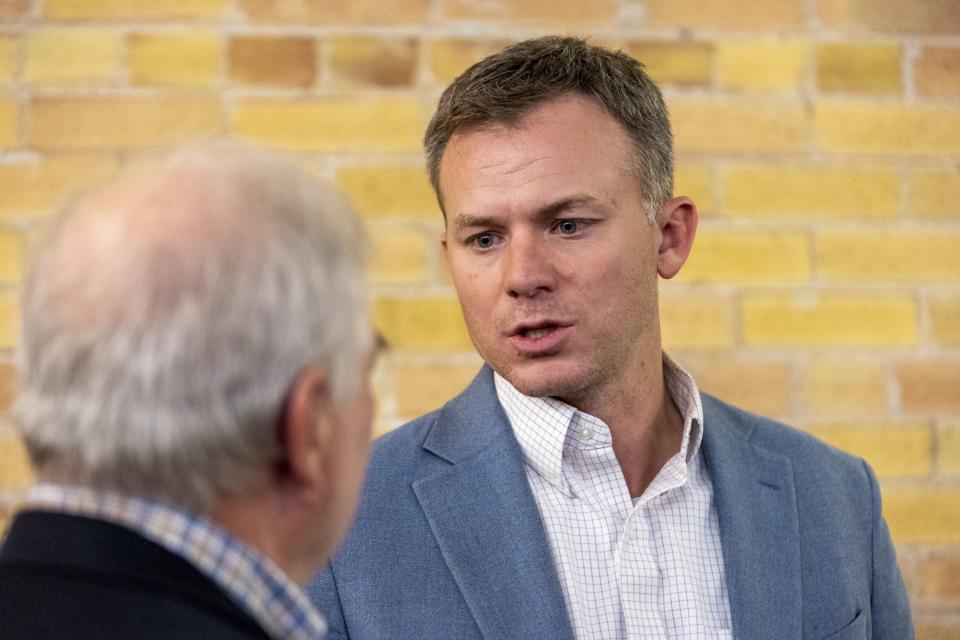Rep. Blake Moore wants to extend COVID-era tax break for charitable giving

A new bipartisan bill would extend a COVID-19 era provision that allowed taxpayers to reduce their tax bill by donating to charity.
Currently, only taxpayers who itemize their taxes — typically those with higher incomes — can take a charitable deduction, but during the pandemic all Americans who filed tax returns could take a deduction of up to $600 if they gave money or goods to charity. That credit went away after 2021.
Now a group of lawmakers, including Utah Rep. Blake Moore, is hoping to bring this option back, while also increasing the amount they can deduct. The bill, called the “Charitable Act,” would raise the deduction to $4,500 for individuals and $9,000 for joint filers.
In an interview with the Deseret News, Moore said he thinks this will help middle class and lower income taxpayers “take advantage of the good that they’re doing” while also encouraging people to give back to their communities.
“It helps civil society ... serve where government can’t or shouldn’t. And every dollar counts, right?” he said.
In addition to Moore, who represents Utah’s 1st District and is on the House Ways and Means Committee, the bill was sponsored by fellow Republican Michelle Steel of California, and Democratic Reps. Danny Davis of Illinois and Chris Pappas of New Hampshire.
Moore released a list of over a hundred nonprofit organizations in Utah that have endorsed the bill. They range from organizations working on suicide prevention to those supporting the arts.
“We want to incentivize people to do what they’ve always done — to be able to contribute to causes they care about, whether that be a specific issue like poverty, homelessness, or to their church,” he said.
After Republicans increased the standardized deduction in their 2017 tax legislation, many Americans no longer itemized their taxes, leading to a reduction in the number of people who could claim the charitable giving deduction. But under the Charitable Act, all taxpayers who file a return would be eligible to take the credit.
Related

Several national charitable organizations threw their support behind the bill, including the American Heart Association, Goodwill Industries International, United Way Worldwide and the YMCA.
Charitable giving dropped in the fourth quarter of 2022, according to data compiled by the Association of Fundraising Professionals. And over the past year, even during periods of time when the amount of money given went up, the number of people who donated dropped.
That wasn’t true during the pandemic when the charitable deduction was expanded, according to Mike Geiger, president of the fundraising professionals association. The number of small donors who gave money went up in 2020 and 2021, “but then small-gift donors collapsed in 2022 after the temporary universal charitable deduction was not renewed,” he said in a press release provided by Moore.
Nonprofit organizations hope this bill could reverse that trend.
“As expected, the universal charitable deduction enacted temporarily during the height of the pandemic unlocked more giving. Making the deduction permanent will provide an ongoing incentive to increase giving and also will counteract inflation,” said Suzanne McCormick, USA president and CEO of YMCA.
Utah has ranked first among states when it comes to charitable giving by WalletHub. The rankings are based on a calculation of per capita monetary donations and hours spent volunteering and serving. Utah ranked high on both metrics.
Related
When asked whether he was concerned the bill leading to a drop in revenue for the federal government — especially during a time of negotiations over the nation’s growing debt — Moore said he was more concerned about communities having what they need to help people.
“The federal government can’t solve every problem in every single community,” he said. “So I want to make sure I empower the individuals in all of our communities to ... give to those causes that they care about.
“We shouldn’t be relying on government for everything,” he said.
Moore said Sen. James Lankford, R-Okla., plans to introduce a similar bill in the Senate.

 Yahoo Autos
Yahoo Autos 